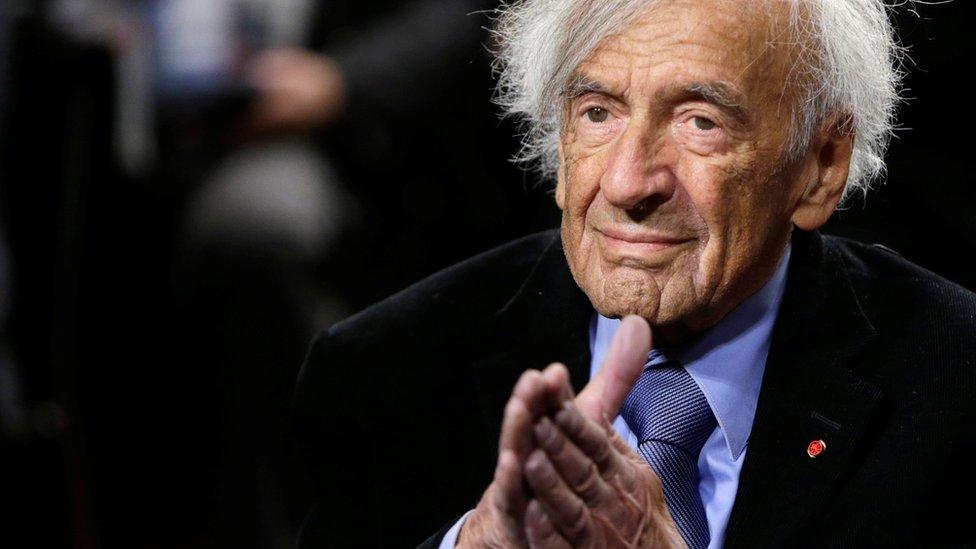Auschwitz survivor Elie Wiesel dies aged 87
- Published
A look back on the life of Elie Wiesel
The Holocaust survivor and Nobel peace laureate Elie Wiesel has died aged 87.
He died in the US, where he lived and had been a citizen since the 1960s.
He became famous after writing about his experiences as a teenager in Nazi concentration camps, where he lost his mother, father and younger sister.
He dedicated his life to ensuring the atrocities committed under the Nazis were never forgotten, and the president of the World Jewish Congress has called him "a beacon of light".
Israel's Yad Vashem Holocaust remembrance centre announced his death on Saturday.
US President Barack Obama said Mr Wiesel was "one of the great moral voices of our time".
Elie Wiesel was born in Romania in 1928. In 1940 his town, Sighet, was part of a region that was annexed by Hungary. Four years later the town's entire Jewish population, including 15-year-old Elie and his family, was deported to Auschwitz.

Elie Wiesel lost three members of his family in Nazi death camps
Mr Wiesel's mother and one sister were killed in Nazi death chambers. His father died of starvation and dysentery in the Buchenwald camp. Two other sisters survived.
After the war, Mr Wiesel lived in a French orphanage and went on to become a journalist.
He wrote more than 60 books, starting with Night, a memoir based on his experiences in the death camps.
It included the lines: "For the survivor who chooses to testify, it is clear: his duty is to bear witness for the dead and for the living.
"To forget would be not only dangerous but offensive; to forget the dead would be akin to killing them a second time."
'Take sides'
Mr Wiesel's use of the term Holocaust helped cement the word's association with Nazi atrocities against the Jews.
In 1986, he was awarded the Nobel Peace prize for his role in speaking out against violence, repression and racism.
When accepting it, he said: "Whenever and wherever human beings endure suffering and humiliation, take sides.
"Neutrality helps the oppressor, never the victim. Silence encourages the tormentor, never the tormented."
After Mr Wiesel's death, the head of the World Jewish Congress said he was "undoubtedly one of the great Jewish teachers and thinkers of the past 100 years".
Ronald S Lauder said: "We have lost the most articulate witness to history's greatest crime.
"His passing leaves a void that will be impossible to fill. At the same time, his writings will live on."
Israel's Prime Minister Benjamin Netanyahu said Elie Wiesel "served as a ray of light and an example of humanity that believes in the goodness of man".
The country's president, Reuven Rivlin, called him "a hero of the Jewish People, and a giant of all humanity", while Barack Obama said he was "not just the world's most prominent Holocaust survivor, he was a living memorial".
Mr Wiesel leaves a wife, Marion, who also survived the Holocaust, as well as a son, Elisha.